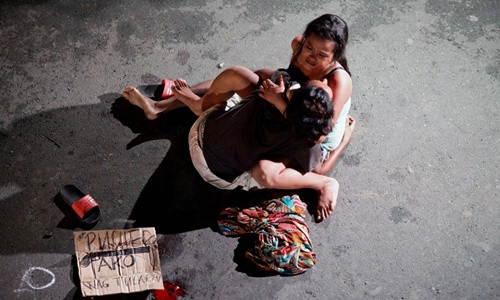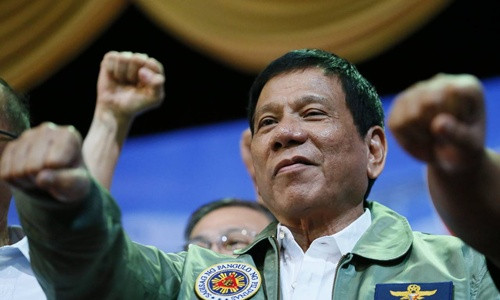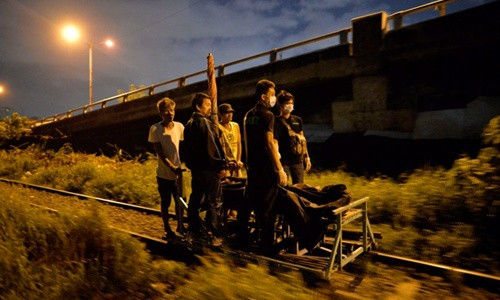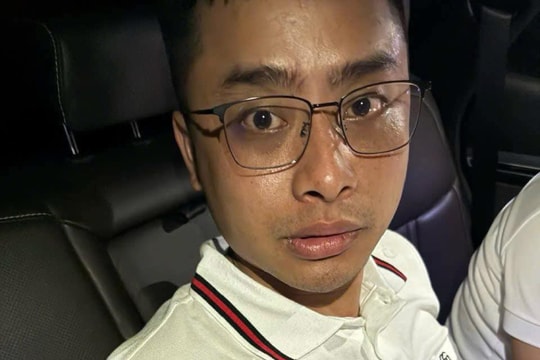20 years of cleansing the 'murder city' shaped Duterte's style
Philippine President Duterte hopes that the policies that helped him change the face of the "murder city" Davao years ago can change the face of Philippine society today.
 |
| A woman holds the body of her husband who was shot dead on the streets of the Philippines on suspicion of drug trafficking. Photo: Reuters |
In the Philippines, the two-decade dictatorship of President Ferdinand Marcos that ended in 1986 ushered in a turbulent future. The new government of President Corazon Aquino faced a series of challenges, from coup plots within the military to uprisings demanding reform by angry protesters. The Philippines was beset by a series of problems such as corruption, crime, economic stagnation, riots..., according to the Atlantic.
'Murder City'
In 1987 and 1988, reporter Sheila Coronel had the opportunity to travel to Davao, a city on the southern coast of Mindanao province, Philippines, to report. Coronel witnessed Davao sinking into instability, poverty due to uprisings and social disorder due to lax law and order. This place became a fertile ground for crime to thrive.
The streets were packed with checkpoints. But they did not stop criminals from shooting each other, and even police, in broad daylight. In 1985, Asia Week magazine called Davao "Murder City."
Late one night in September 1988, Coronel and his colleagues drove around Davao with newly elected Mayor Rodrigo Duterte, to learn about his policies to change the face of the city. Duterte spoke animatedly about the challenges of maintaining order in Davao.
He recounted how he once went to a hospital and disconnected a severely injured drug dealer from the ventilator. His colleague also told another story about Duterte’s claim that he threw a drug dealer out of a helicopter. No one could verify the veracity of these stories. But Coronel knew they were far less frightening than the stories he heard from the backstreets of Davao.
In May, Mr. Duterte, who served as mayor of Davao for 21 years, was elected as President of the Philippines. He vowed to wipe out drug crimes in just the first 6 months of his term with unprecedented tough measures. So far, President Duterte's anti-drug campaign has left nearly 3,000 people dead in just three months.
Despite criticism from the international community and human rights groups, Mr. Duterte has no intention of backing down. "I will not stop until the last drug dealer on the streets of the Philippines is dead," President Duterte declared on September 19. "I will kill all drug lords. Without mercy."
For Mr. Duterte and his supporters, Davao City, once labeled the "cradle" of drug crimes and now transformed into one of the most peaceful areas in the Philippines, is the clearest proof of the effectiveness of the method of fighting crime that the Philippine President pursues.
According to Coronel, Mr. Duterte has staked his political life on the assumption that if the people of Davao can pay such a high price for stability and order, then the entire Filipino population is fully capable of doing the same.
But Davao’s success did not come naturally. To restore order, Mr. Duterte had to enact a series of strict control policies, such as imposing curfews for minors and banning the sale of alcohol at night. Unlike most other places in the country, traffic rules and laws in the city are strictly enforced.
Some human rights groups say Mr. Duterte ordered the creation of the so-called Davao Death Squad, a group of thugs, former soldiers, and police officers tasked with wiping out criminals. Between 1998 and 2015, the squad is accused of killing more than 1,400 criminals, including children, on the streets of Davao.
Last week, a man named Edgar Matobato testified before the Philippine Senate that he was a member of the Davao Death Squad. The squad was formed in 1988, shortly after Mr. Duterte became mayor. Matobato said he and other squad members were paid by the city. They were tasked with killing suspected drug dealers, rapists, and robbers. Matobato added that he once dismembered victims and fed them to crocodiles or buried them in a mine shaft. Mr. Duterte denied the allegations, calling them “accusations from a madman.”
Define your style
 |
| Philippine President Rodrigo Duterte. Photo: AP |
According to experts, the drastic measures Mr. Duterte has pursued were shaped by his time as mayor of Davao. They are resonating with the anxiety inside Philippine society. Many people still do not trust the government apparatus as well as law enforcement agencies.
Last year, a nationwide survey found that although crime rates have dropped, insecurity remains. The Philippines is not yet classified as a crime-ridden country, but drug trafficking is growing rapidly and the government has not been able to contain the problem, experts say.
Across the country, from the poor to the middle class, people are worried about the drug problem. However, most of the traditional political elites have shown indifference and inability to solve the burning problems in society. Therefore, it is not surprising that Mr. Duterte’s campaign to declare war on drug crime has received a response from the people, Coronel commented.
To understand what drives Mr. Duterte to pursue tough measures in his war on drugs, observers say, one must go back to when he first entered politics. In Davao in the early 1980s, the infighting between political forces turned the city into a real battlefield.
“You have to see it with your own eyes to understand the chaos,” Coronel said. The city was terrorized by “vigilantes” armed with knives and guns who patrolled the streets. Davao was a testing ground for counterinsurgency strategies, he added.
Amid the chaos, Mr. Duterte emerged as the city’s only hope. In just a few years, he has succeeded in stabilizing the political situation in Davao. His policies have pleased the city’s elite, who have benefited from the growth of their businesses.
He maintained cordial relations with Muslim separatists and won support from NGOs for his programs to help the poor. Davao has now transformed itself into one of the Philippines' most stable tourist and commercial centers.
However, many believe that Mr. Duterte would hardly succeed without the force of anonymous masked gunmen commonly known as the Death Squad.
Challenge
 |
| The bodies of two people shot dead by police on the streets of the Philippines are carried away in a cart. Photo: Reuters |
Experts say President Duterte seems to be betting that the strategies he implemented in Davao will work across the Philippines. But that is precisely the root of the problem. Managing a country of 100 million people is much more difficult than managing the problems of a city of less than 2 million.
In addition to the political turmoil that has lingered since the fall of the Marcos regime, the Philippines today faces a host of other challenges, including a culture of political pluralism, an aggressive press, and a volatile civil society.
In Davao, Mr. Duterte does not have to worry about foreign policy. But as President of the Philippines, things are much more complicated, Coronel said. The anti-drug campaign initiated by President Duterte, which allows extrajudicial killings, although receiving consensus from a part of the people, is being strongly condemned by the world, threatening his reputation in the international arena.
On the other hand, as president, every statement Mr. Duterte makes requires weight, almost equivalent to an official policy. But Mr. Duterte has long been known as a president with a loud mouth. And this is the thorny issue for him at the moment.
According to Coronel, if he adjusts his tone to be more somber, he will lose the strong image he has built for so long. But if he insists on maintaining his previous attitude, Mr. Duterte needs to quickly find a way to ensure that his outspoken statements do not create conflicts on human rights issues, foreign policy or cause divisions with the international community.
"He is in the middle of new territory. The Davao strategy is no longer relevant. It is time to write another book," Coronel said.
According to VNE


